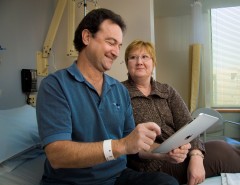 If you’re supporting a friend or family member who is undergoing cancer treatment, you may not think of yourself as a “caregiver.” It’s a role that can be very rewarding, but also challenging and stressful.
If you’re supporting a friend or family member who is undergoing cancer treatment, you may not think of yourself as a “caregiver.” It’s a role that can be very rewarding, but also challenging and stressful.
You may find yourself juggling an incredible range of duties above and beyond what you regularly do at home and at work. From driving your loved one to appointments, to discussing medical issues with health care professionals, to making dinner every night, you may find that you’re taking care of nearly everything – except yourself.
But your loved one’s well-being depends on you, so it’s important that you also take care of yourself. Nancy Borstelmann, LICSW, MPH, a licensed clinical social worker who serves as Dana-Farber’s director of patient and family support and education, shares some tips that may help.
- Find a balance. You’re more likely to be a better caregiver when you’re in good emotional and physical health. Try not to feel guilty about taking time for yourself. Rest when you’re tired, and try and incorporate exercise into every day. Even a short walk around the block can be refreshing. Plan healthy meals to make sure you’re getting good nutritional balance. Keep things simple to conserve energy.
- Don’t go it alone. Ask family and friends to pitch in when needed, and don’t be afraid to delegate. If someone offers their help, accept it. Suggest a specific activity they can do, such as making a meal, providing a ride to a doctor’s appointment, or emailing health updates to friends and family.
- Use tools to help you manage your time. Reduce your daily stress by getting things in order. Use a notebook or computer to get organized and track appointments and contacts. Keep important papers such as insurance forms and medication lists easily accessible.
- Let it out. Know that it’s OK to feel overwhelmed or even angry once in a while. Share your feelings with others. Consider joining a support group or talking with friends and family about the challenges and stresses you face. Ask your loved one’s health care team how to find helpful advice for cancer caregivers or caregiver support groups. You may be surprised to see how much it helps to talk with others who know what you’re going through.
- Stay in touch with your loved one. Responding to a cancer diagnosis is challenging, but when possible you and your loved one should try to continue to do activities together that you both enjoy. Slow down and cherish your time together. Visit with friends when you can, and try to keep a sense of humor. Take time to talk about how you both feel, and how you’re coping. Sharing experiences can strengthen your relationship and help you feel more connected amidst all the challenges.
Are you a cancer caregiver? What tips do you have for someone who may just be taking on this new role?

Great tips — thanks for sharing them. Here are a few tips I share with cancer caregivers…Be as compassionate with with yourself as you are with others. Set the bar low enough to be achievable. Bring a bit of mindfulness into to each day by simply noticing one thing you didn’t notice yesterday. And most important…remember to BREATHE!
Almost 2 years into my journey as a caregiver, I would say that asking for help is not always easy. Sometimes you can’t figure out what you need far enough in advance to arrange to get it from someone else. That is okay too. Other times, you are surprised that family is not as helpful as you thought they would be. They just don’t know what to do. My best advice would be to start with local information resources, like a therapist or a senior center. Even if you are not elderly, seniors have established networks to help each other and might either be able to help you or identify another organization in town that can. Also, check to see if your town has a Neighbor Brigade. I have often found it easier taking help from strangers, whose busy lives I am unfamiliar with, than my own family and friends. God bless you!
Finding “caregiver” support groups has been one of the most difficult challenges for me. It has been three years of “fighting cancer” with my husband and I am still searching for the support group. I am grateful that I could turn to a professional psychologist for that listening support.